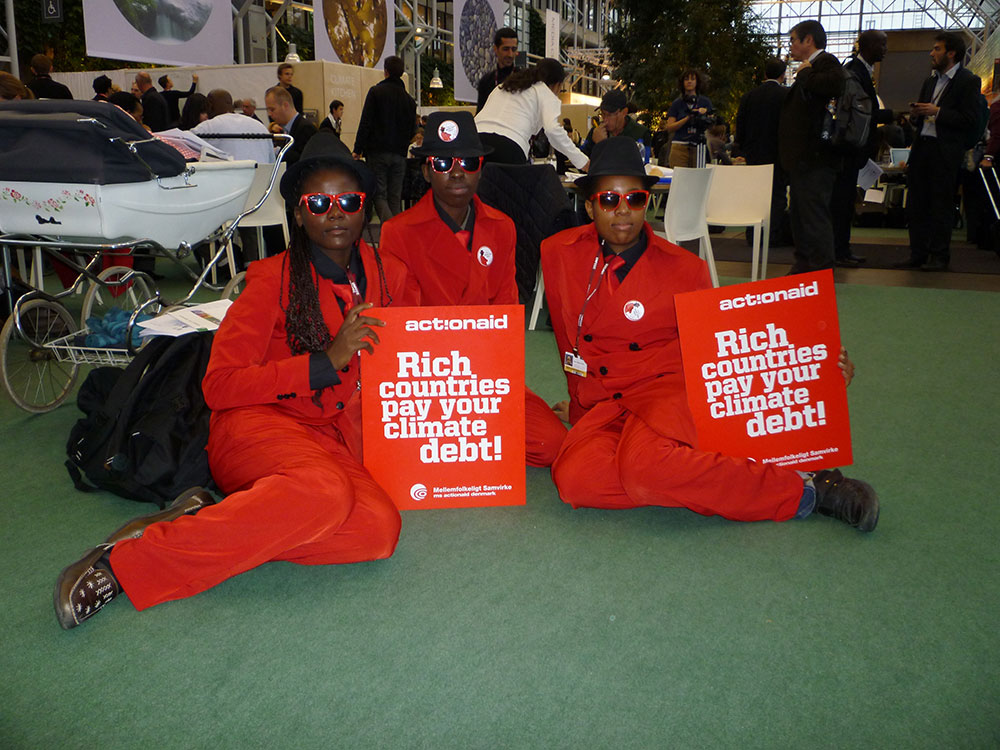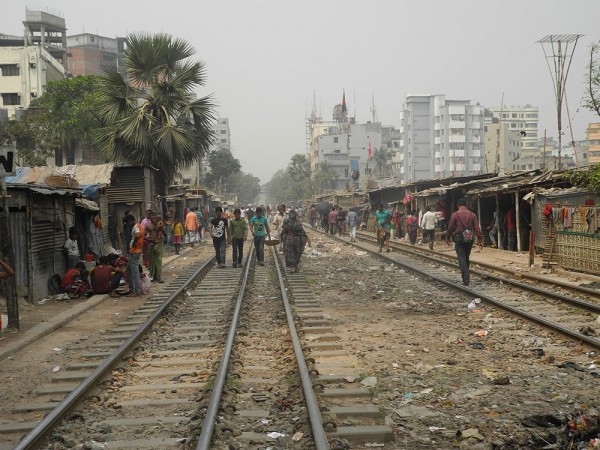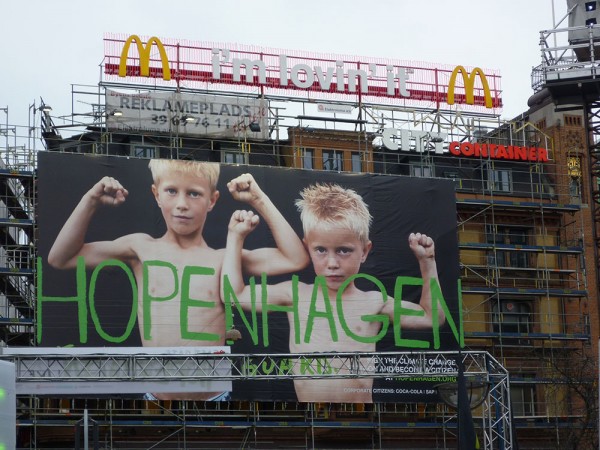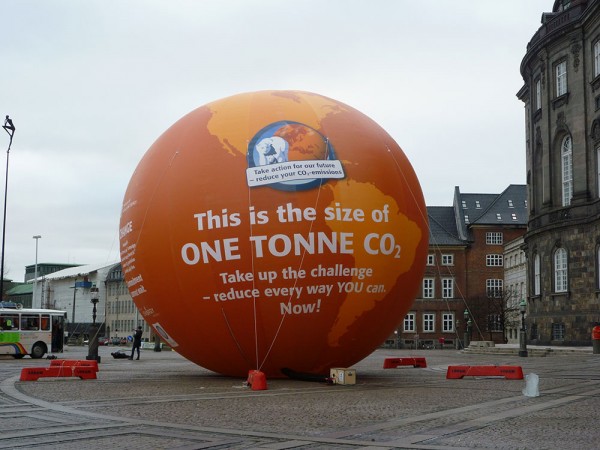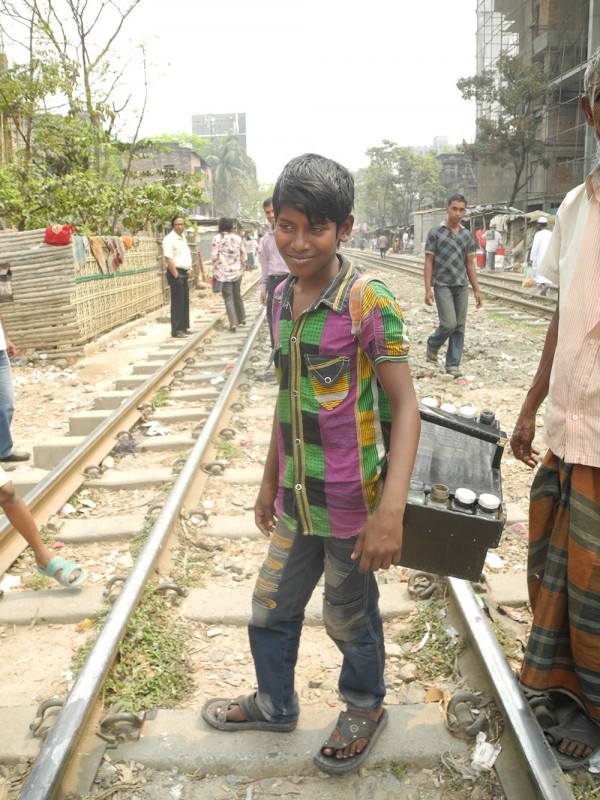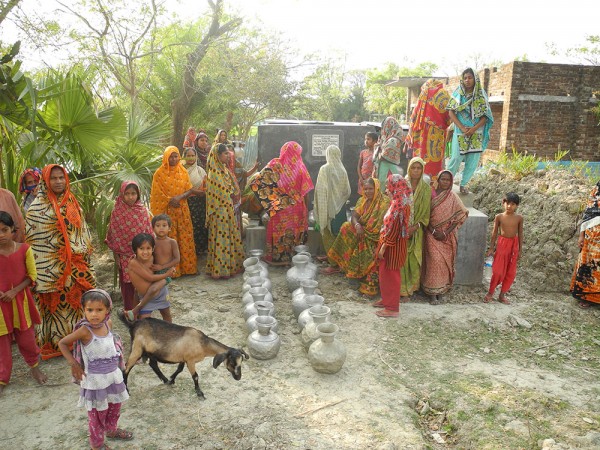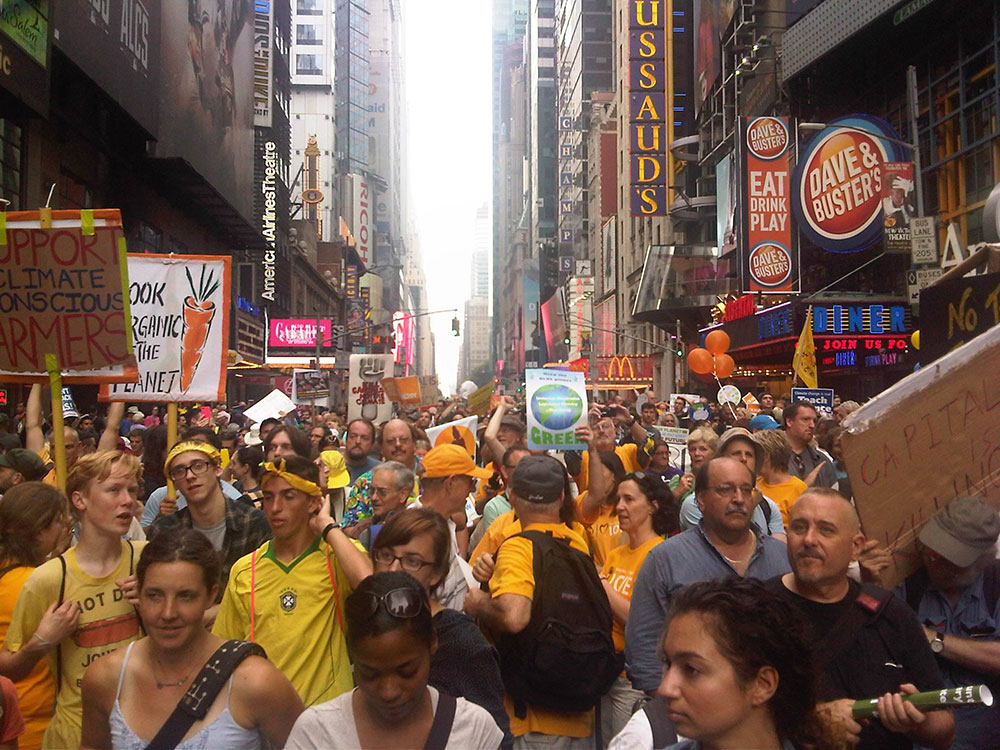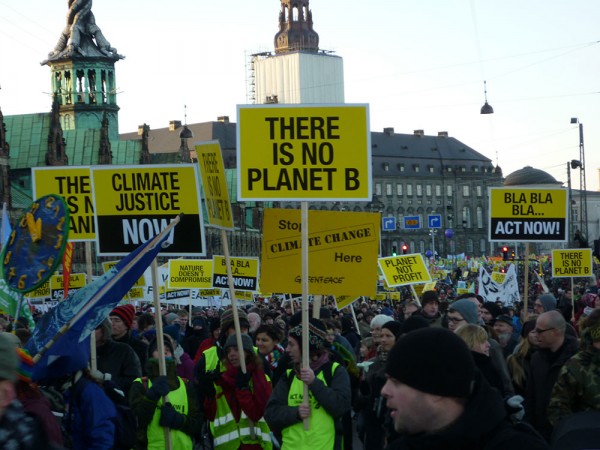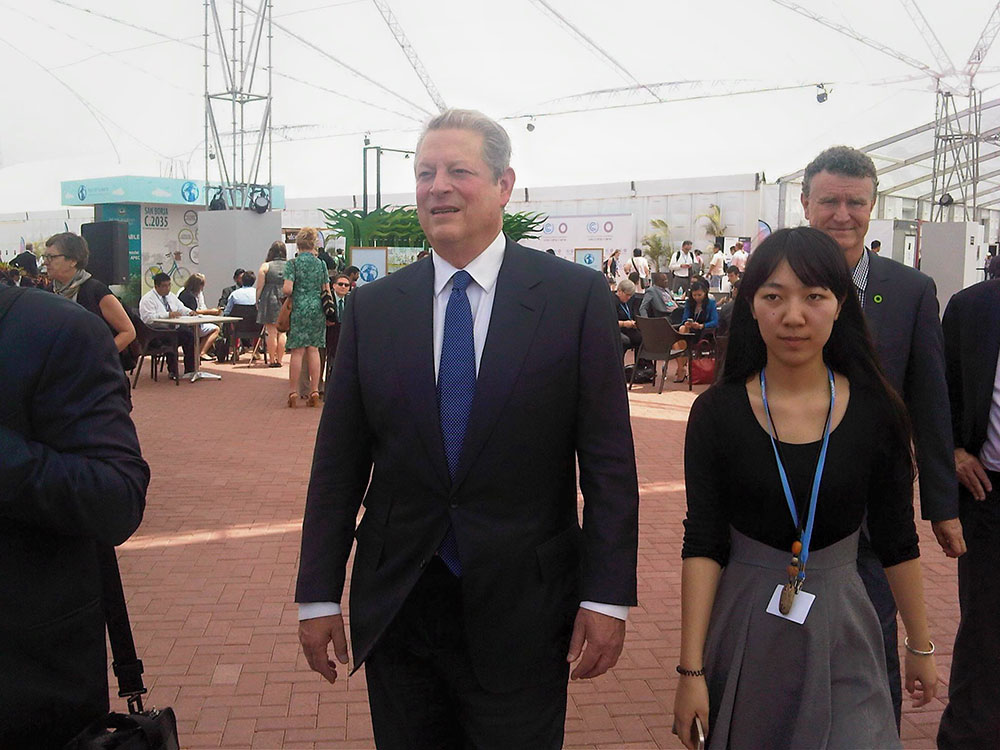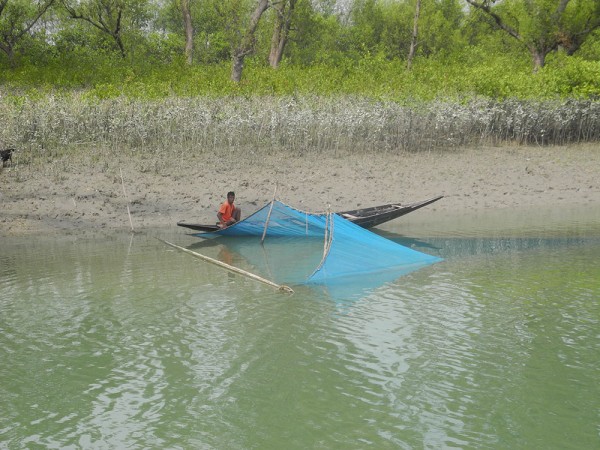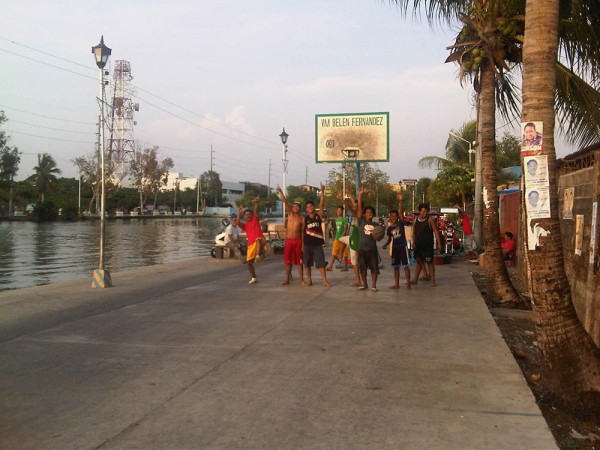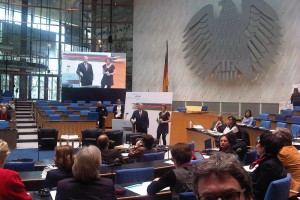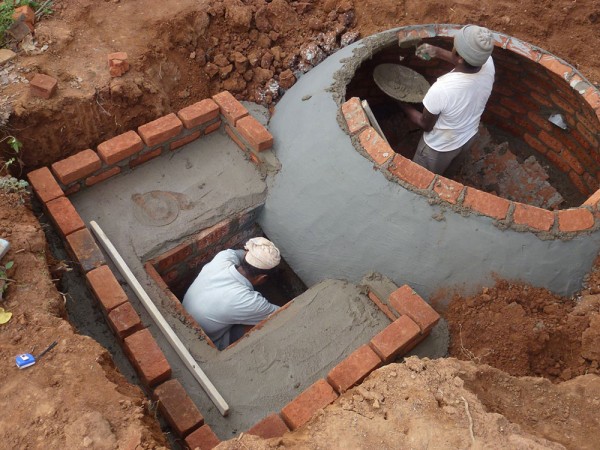“Everybody should have to pay the environmental costs for every bit of fun in their life completely!”
The graduate geographer Sabine Minninger works as advisor for climate policy at “Brot für die Welt” (engl.: Bread for the World), the German protestant aid organization. In this capacity she seeks the dialogue with politics, to demand the needed political steps in dealing with climate change and lastly and after all to call for a just agenda for the big climate conferences.
Before she did work for “Atmosfair”, an organization that offers compensation for flight emission, which is the CO2-correction for you own flight behavior. It’s a service that is now offered by many providers, and that is especially important for the flight intensive culture industry. “Brot für die Welt” offers their own program with “Klimakollekte” (engl: climate offerings).
Sabine Minniger works and lives in Berlin, but in the last years she was on the road on behalf of the combat of climate change virtually permanently — a constant sisyphian task, propelled by the big hope to increase the poulation’s mobilization-potential to help develop a state of realization in the political operations, and thereby set a good breading ground for results at the very important World Climate Summit in Paris in December.
With Kaput she talked about the very big questions of the world climate, as well as the ecological assessment of festivals and the inconsistencies of our lifestyles.
Right now you are following the UNO-climate-negotiations for “Brot für die Welt”, which means that you are close to the preparations for the show-down in Paris at the end of the year. How is the current mood?
The UNO-climate-negotiations are being split into a big summit, that has been taking place for 2 weeks every December, for the last 20 years, and intersessions, negotiations which are necessary, because these 2 weeks aren’t enough time to iron out all the crucial issues. Unlike the summit (now it’s in Paris, then in Africa, and then likely in Asia) the intersessions usually take place in Bonn, where the United Nations Secretariat for Climate is located. Logistically it’s easiest to organize them there. But sometimes they take place at the UNO in Bangkok, in Nairobi, or in Panama.
After 20 years of climate negotiations, the first global climate agreement is supposed to be agreed upon in Paris.That has never happened before. Up until now only the developed countries had to oblige t do something, like with the Kyoto Protocol. China, for example, as an emerging economy is considered to be a developing country and was never willing to assume responsibility to date. That was fair, because the developed countries caused the climate change after all, and therefore had to take more responsibility – but now there simply is no other way. By now China has the biggest CO2-emission in the world, they surpassed the USA. A climate agreement without China doesn’t make any sense. We can only keep the world climate beneath the important 2-degree-warming-limit until the end of the century, if everybody participates. Even China and India, who have to cut back immensely.
You just named the critical point for the negotiations.
Exactly, that’s why they always fail. Since Copenhagen in 2009, where they last tried to make an agreement, everyone has been working towards Paris, and has been trying to prepare the solution of the major issue of fairness. China and India have to play along — but it will not happen without high financial commitments by the developed countries.
Let’s get to a pop-related question — I did set up the interview in the area of tension between general question on climate protection and the agreement as well as questions concerning music and lifestyle. A few years ago we got into a conversation about you helping Richie Hawtin to arrange the carbon footprint and offset of his flight emissions. Maybe you could explain how that works.
The idea to save the emission caused by yourself came up because the climate negotiations were going so badly and were not providing solutions. Other initiatives had to be started, not just agreements based on international agreements, but individual approaches.
The United Nations can only create treaties based on the minimum consensus, it will never be able to achieve a major coup. The idea to offset flights came up, because there is no possibility to agree upon a global solution for the reduction of emissions in this sector — sadly theses globals emissions cannot be assigned to a certain country. But they can definitely be assigned to a certain person, namely the air traveler. People who fly have the possibility to offset their emissions at another place in the world. Consider the example of a flight from Cologne to New York and back: on both ways together around 3.5 tons CO2 are being blown into the atmosphere — for that you have to pay exactly the costs to replace a diesel generator with e.g. solar energy in a developing country like for example India. 3.5 tons can be offset through application of wind-, solar-, water-, or biogas-energy, energy efficient ovens are being used as well. The most important points are that the projects are oriented on energy efficiency, are sustainable, and are profiting locals who could not afford it.
A lot of people in the music business have immediately taken position, not only Richie Hawtin. Even someone like Eddie Vedder from Peal Jam, who bought a piece of forest — which is a nice thing, but you cannot really correctly offset tons of CO2 with forests. At least he was a trailblazer in regards of environmental protection. Richie Hawtin said that he and his Minus-label want to specifically offset every ton he blows into the atmosphere through his life as a DJ.He works together with the reliable provider “Atmosfair” from Berlin. But “Brot für die Welt” offers that with the Klimakollekte as well. It only works with energy-efficiency-projects, not by planting trees. You cannot exactly measure the ton saved from trees, and you never know if the tree still stands tomorrow.
What sums are we talking about, with someone like Hawtin?
I’m not sure if he did it retroactively for his whole career, or if he just started listing it at a certain point. With reliable providers the price for the ton is generally expensive, you might have to pay prices around 23€ for it — which would be around 82€ for a flight to New York.
Are you approaching others — for example techno labels from Berlin — to confront them with their numbers?
“Atmosfair” as well as “Klimakollekte” are practicing deliberate acquisition. I’m not doing that anymore, as I am working in political and advocacy right now. Someone like Richie Hawtin has been able to motivate a lot of DJs to contact “Atmosfair”.
Airlines do offer possibilities to offset as well. Do you have numbers how many people are doing that voluntarily?
Less than one percent. Only a few highly enlightened, very environmentally conscious citizens are doing that. People, who, for example, live at Prenzlauer Berg in Berlin, vote green, and only buy ecological products — but still have the biggest carbon-footprint, because they spent very much money for air travel. The incentive can’t be that you can offset everything — the questions you have to ask yourself are: Do I really have to fly or can I take the train? Do I have to cause emissions? Can I reduce them? That should be the guiding principles, and only if you can’t avoid that they are caused you should figure out how to offset them. It should not be a carte blanche.
This brings me to the next question. What does a climate friendly way of life include, for you: Green power, separating garbage, fair produced clothing, a less-meat-based diet — and how can you get the privileged hipster to implement all of these requirements into their specific lifestyle?
The issue of sustainability starts in your head. I do not want to keep people from separating garbage, that is certainly very important. But much more important is it to sensitize everyone for the bigger subjects. It’s half the battle, if people develop the awareness, that they hurt the atmosphere with what they are doing. Only then grows the understanding that what we are doing here in the global North is not only affecting the climate, but also the poorest people in the global South, who can not protect themselves from climate change properly.
Keyword: Climate-friendly festivals. The other big issue in the music business. What has the Fusion been doing so right for years? Why do Melt! and co. lag behind and masquerade themselves on the surface? These are not my questions and deductions, I got that from quotes from you.
The fusion convinces with its consequent, local value chain. Vendors are only selling self-made, local, and seasonal products. Everything is vegan or vegetarian. There is no meat at Fusion. They were the first ones with a reasonable waste management, they distributed trash bags for a deposit. Their mission was to leave the area the same way as they found it.
Whereas Melt! is not able to manage that, with all the highly commercial brands involved. They are very proud that 30% of the products are local. Why isn’t it possible to have 100% local products?
The problem is, that Melt! is a micro-depiction of the global economic structures. If Melt! at its small festival in Gräfenhainichen isn’t able to say, we are here now in Eastern Germany, and we are going to include local vendors, because we don’t to leave a big carbon-footprint caused by transporting the goods through the whole republic, how should it work in the bigger picture?
When I asked at a press conference, why it is only 30%, they just referred to existing contracts. Like the big brewery from Western Germany, that just has to deliver their beer there. Melt! already has the energy consumption and carbon-footprint of a medium sized German city, because of the sound- and lighting-system.
What about Fusion?
I would like to know that. Fusion uses considerably less light, but they do have loud sound systems, although not as bombastically big as at Melt!
But you have to attest to Melt! and most of the other German festivals, that they at least try. Why is the rest of the world so far behind? Every year I get sick to my stomach when I see pictures of the destruction after Glastonbury is over. Are you getting involved there? Are you going there directly to consult?
Absolutely! You have to commend Melt!. They introduced a very praiseworthy, sustainable transport-management-system — the people are supposed to come by train or car-sharing. But the big brands, that are present at Melt! and that are doing it as a part of their marketing-strategies, should serve as role models. Their audience is already far ahead of them. So much could be done here proactively.
For example?
They could offset the whole festival, for example. Save all of the unavoidable emissions.
What would that amount to?
I can’t estimate that exactly. But let me say this: Everybody should have to pay the environmental costs for every bit of fun in their life completely. Right now they are being paid by the poorest countries and most vulnerable in the world: Bangladesh, Vanuatu, Kiribati, Fiji…they are paying for the fun we are having up here.
Where you offering that service?
In my old position I actually once did ask that at the Melt! press conference. They didn’t really give an answer to the question. I also asked if they would prefer it, if emissions of the music industry would be registered in the political agreements, so to speak as part of the Kyoto Protocol. The answer was that they did not want that under any circumstances, and that it should be organized voluntarily. The Kyoto Protocol registers the emission from sectors like the cement industry, but not flight emissions.
Stop lambasting Melt!, they are not the only ones who should be criticized! In my initial question I did also mention Glastonbury and all of the other international festivals. So much more is in a sorry state with them!
Okay, you’re right. But I know so much more about Melt! than about the other festivals. Yes, the criticism is universal for all festivals.
It’s gross, really gross — those people vote green, fight with their roommate about who ate their organic yogurt and reject meat consumption — but at festivals they misbehave completely. Education is what’s missing there. The organizers should be responsible for that.
Let’s talk about Live Earth, the series of music events that is supposed to sensitize the people for the summit in Paris. Yet, with Control Room and Live Nation very big companies from the music industry are involved. Companies that are not necessarily without controversy. Pearl Jam once sued Live Nation, because they thought that Ticketmaster, as part of the group, is creating a dubious monopoly, and that they are demanding fees that are way too high, and thereby creating too expensive ticket prices. That said: How do you handle partners like that?
That is quite interesting to me. You see that a lot. Whether it’s with human rights, and child protection, or environmental protection and climate change mitigation, a lot of companies use these sectors for mere green-washing purposes, and try to make themselves and their business look better with the help of charity-events. That’s exactly why I’m not a big fan of charity. Let’s say Lufthansa i going to finance an orphanage in Africa, that’s charity. Real corporate social responsibility would mean, that they would obligate themselves to keep their own company clean. I really don’t like companies that do not act ethically justifiable, and then try to wash themselves clean with a matter like that.
I can’t tell you in detail how those companies act. But one thing seems clear, they are behaving stone-cold and drive out their competitors on the market. That is the alternative draft of a culture of small, local organizers.
Like everywhere else, you should consider carefully who to get on board as patron or co-supporter of a good deed. You should avoid getting exploited.
Are you involved in selection processes like that?
Not really, like I said I’m doing political lobby work. Although we like to highlight events like Live Earth or the demonstrations at the special climate summit in New York last September, where more than half a million people demonstrated. We remind the politics, that no matter what they decide, the pressure will not decrease. Events like Live Earth do mobilize people — even Al Gore is on board there.
What do you have to imagine is the the actual role of someone like Pharrell Williams, who is the creative director for Live Earth Road to Paris.
That’s mainly a lip service. But they do already suffice. Take someone like Leonardo DiCaprio: With his foundation he puts a lot of money into environmental protection and climate change mitigation. But he has one of the biggest carbon-footprints in the whole world, because of flights with a private jet and so on. But he is always telling the whole world that everyone has to drive hybrids, and that he owns an energy self-sufficient apartment in New York, that achieves a great deal through the media, sensitizes the people.
At the end of the year, the climate summit will take place in Paris. There the first global climate agreement is going to come about, it is supposed to replace the Kyoto Protocol. We all know, that the latter and it’s implementations weren’t really satisfying. In this respect this question: What is the objective this time? What do you think will be implemented satisfyingly on-site, and will be included in the globally binding contractual agreements, and what of this will actually be implemented afterwards.
I actually think, that the UN politics is unable to reach groundbreaking results. Paris is going to be an agreement based on minimum consensus, that will not help the climate, and will only guarantee, that the world-democracy will remain intact, and that we will continue to talk about climate politics. But Paris will have to deliver an architecture that can be the basis of future negotiations and development, which should take place every five years.
The pressure can only come from the public, from mobilizing the people. They have to understand, that their initiative it the key. Even the Chinese peopler are realizing that by now: they cannot stay outside, because of the smog — like it is in many developing countries. The Chinese want to get away from coal towards renewable energies. The increase of catastrophes changes the people’s minds. If Germany will once again be partially under water for a few more summers the pressure on the politics to push the energy transition a bit more dedicatedly will increase as well. Climate politics must come from the middle of the society and not be left to the green and development groups alone.The politics only react if the pressure from the public increases — not unlike the nuclear exit after Fukushima. Shortly before that the chancellor extended the terms of the nuclear power plants once again. But after so many people demonstrated she had to react. It has to happen exactly the same way with climate change mitigation.
But I’m still positive, because of several reasons. Renewable energies became so affordable and are able to compete. The argument that coal is cheaper is redicioules by now. You have to remove the felt in Germany, so that CDU and SPD cannot be pressured by old industrial interrelations anymore.
Did you ever consider going into politics?
Never. It is really lame to say that from the bench of criticizers, but personally I don’t have any interest in that. As a politician you have to be a figurehead to a large extend. I want to be able to still look into the mirror every morning concerning every thing I do — and with Brot für die Welt I have that freedom. It would be awkward for me, if my picture would be in the press concerning a subject I couldn’t identify with for 100%. You can’t do that as a politician, you always have to compromise. I don’t have to do that, I can always say what I think and want.
Did the other side ever try to lure you?
That happened once. The Deutsche Bahn called me one time. They encouraged me to apply for the position of environmental manager, after they saw how I took action against Lufthansa and how I stood up for the taxation of environmental pollution in air traffic and shifting subsidies to the train traffic. But I’m not interested in national politics, I like the international development perspective.
And now, towards the end of our conversation: How drastically does someone, who deals with it every day, see the development in the next 10, 20, 30 years? Will we in Germany still be sitting outside on the street at night in 2030, like we do today?
Yes, we will. Climate change mitigation is a step of the civilization that we are taking in right now. We will experience a few intense event here as well. But I’m deeply convinced, that everyone will understand that in the long run. If you are out in a developing county at night you just can’t sit outside anymore. Even in Thailand that is not possible away from the beaches. It’s especially bad in Peking, where people do not have any quality of life left. These ecological effects will surpass the interests of the economy someday — in China it has already affected the economy so badly, that even there they have to rethink it. The climate negotiations are actually just there for international exchange and to reach minimum regulations. Change comes through initiatives of the countries and that comes through pressure from the voters. Everything has to come from the inside.
At the moment I’m reading a book from a war reporter „The Great War of Civilisation“. Very depressing. It’s getting worse with every page. But nonetheless every night all of the reporters are sitting together in the hotel having drinks. Is that what the climate entourage looks like every night in the hotel, sighing over the next futile meeting?
In a wider sense, yes. We do have to motivate ourselves within the Climate Action Network, where most NGOs are members. At every big climate summit there is a huge party in between the two weeks of negotiation. It is organized by the NGOs. It’s on the Saturday before the off-day on Sunday. The negotiators of the countries are allowed to come as well. These parties are legendary. There are about 20,000 people at these climate negotiations. In Durban and Cancun areas at the beach got rented, in Warsaw and Copenhagen old theaters. Everyone is sitting together and celebrating one another as much as needed to encourage us enough to get through another week of oftentimes dogged and depressing negotiations. The parties serve as a self-help-group.
The guards are coming down and you can talk candidly about everything.
Of course. At the NGO party you will find out what’s really going on.
And how do you handle that once you’re sobered up?
Absolutely professional.
Even if you know, that the negotiator actually shares your position, but would never openly admit it?
There are certain lines at NGO parties. I wouldn’t want to talk to the lead negotiator of Saudi-Arabia to get something out of him. I would never want to chum myself up like that. But you might actually hear something from the delegations of the EU-countries, that might happen. But you can be sure, that whatever is said that night will not be disclosed afterwards. They are not telling me anything I didn’t know before, they just say it out loud.
Now a private question: How long are you even able to do this job?
I’m not sure. I’m going to give everything until Paris. After that I have to shift my focus on projects in the developing countries with our partners, and see specifically on-site what can be done. I need that to continue motivating myself. These nonstop climate negotiations as right now, I can’t do that the same way I have been doing it for the last two years. Towards the last summit in Lima I only slept three hours a night. I slept on the floor of the media centre and didn’t even go back to the hotel. In Paris I will do the same thing again, but after that I have to go back to working normal hours, as well as sleeping normal hours.
It is quite the overtime job, isn’t it?
Yes, but it is also a lot of fun! It’s not my employer, but myself, who exploits me. The network demands a lot, because we do have partners in ever time zone. If you’re having a telephone-conference with Japan, you have to do that at 1:30 at night. But generally it is a big privilege to do work that is this exciting. I’m very grateful for all the travels and encounters, and all the things I was allowed to witness, hardly no one else is allowed to see.
(Translation: Denise Oemcke)








